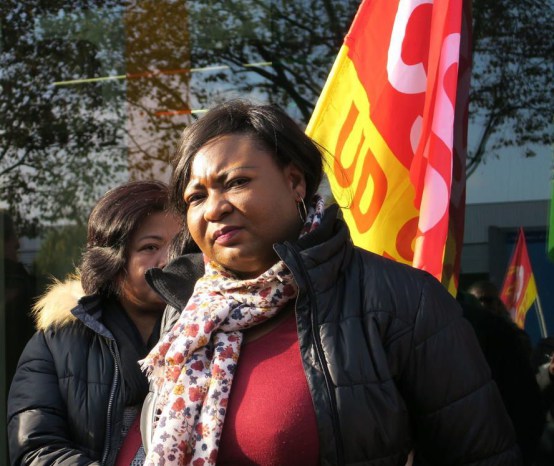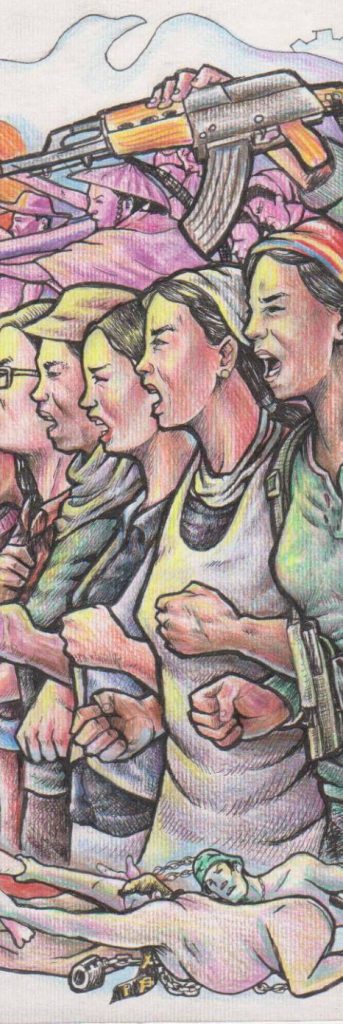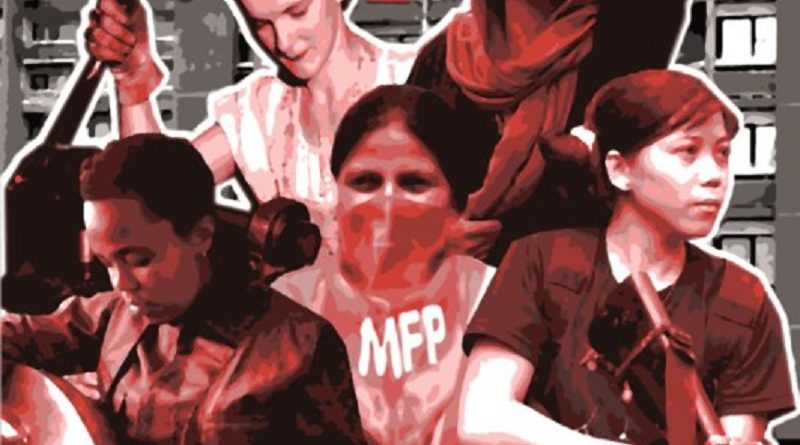March 8: Let’s build and strengthen revolutionary proletarian feminism everywhere!
In conjunction with this communiqué, we invite you to read this text by Anuradha Gandhi on the International Women’s Day published on Inde Rouge .We also point the reader to the collection of texts by Anuradha Gandhi that we translated and published last year called “For a Revolutionary Proletarian Feminism”.
This March 8th will be another particularly important day for demanding the abolition of the patriarchy, the system of oppression of women by men which has emerged with the division of society into classes, and for demanding equality between men and women at the day’s protests.
Imperialist conflict and the rise of fascism: The situation of women in France and in the world
On the international level, where the contradictions between imperialism and oppressed nations are sharpening, the women of the oppressed countries are the first to bear the brunt of imperialist domination. They face the wars imperialists wage to re-divide their countries. They face brutal exploitation in textile factories that catch fire regularly as in Bangladesh. Many of them have to leave their countries because of the unemployment and poverty caused by imperialist plunder to work abroad, in the hopes they can thus send their children to university. This is the case notably in the Philippines, where 30% of the working population lives abroad — the vast majority women who work mainly in the domestic sphere. Women in oppressed countries are the primary victims of sexual exploitation by the imperialists through sex tourism, while they also make up the majority of the ranks of sex workers in the imperialist countries. And on top of that, they still have to fight against the feudal traditions maintained by the comprador class, leading agents in the service of the imperialists in their countries.
 The proletarian women of the imperialist countries are also not spared. In the French media, we hear of Fadila and Ayele, two women who suffer racism and patriarchy who are cashiers in Auchan and O’Marché Frais respectively, both victims of miscarriages in their workplaces because of the sustained effort and work rates imposed by their employers — who have not taken into account their pregnancies as provided for by the Labor Code.We also hear talk around Jacqueline Sauvage, a woman caught up in a climate of terror and domestic violence from her husband; she had to kill him to free herself after 47 years of living together through physical and psychological violence. She was imprisoned for more than 2 years until the mobilization for her managed to free her. There was also the desire for Roman Polanski to preside at the ceremony of the Césars film awards in Paris: Polanski, the pedophile filmmaker convicted of rape of a 13-year-old minor, and despite being a fugitive who INTERPOL is looking for, is happily hosted in France, as well as in Switzerland and Poland. The police rape of Theo as a result of an increasingly aggressive racism is also a consequence of patriarchy, police being the repressive force of the bourgeois and patriarchal state and therefore an ultra virulent force of rape and sexual assault.
The proletarian women of the imperialist countries are also not spared. In the French media, we hear of Fadila and Ayele, two women who suffer racism and patriarchy who are cashiers in Auchan and O’Marché Frais respectively, both victims of miscarriages in their workplaces because of the sustained effort and work rates imposed by their employers — who have not taken into account their pregnancies as provided for by the Labor Code.We also hear talk around Jacqueline Sauvage, a woman caught up in a climate of terror and domestic violence from her husband; she had to kill him to free herself after 47 years of living together through physical and psychological violence. She was imprisoned for more than 2 years until the mobilization for her managed to free her. There was also the desire for Roman Polanski to preside at the ceremony of the Césars film awards in Paris: Polanski, the pedophile filmmaker convicted of rape of a 13-year-old minor, and despite being a fugitive who INTERPOL is looking for, is happily hosted in France, as well as in Switzerland and Poland. The police rape of Theo as a result of an increasingly aggressive racism is also a consequence of patriarchy, police being the repressive force of the bourgeois and patriarchal state and therefore an ultra virulent force of rape and sexual assault.
But all this is just the tip of the iceberg! The oppression of men over women is an oppression that women suffer on a daily basis. Women working in the French state earn 20% less on average than men, they represent 83% of the part-time workers, the majority of temp work, and more than 20% of them are unemployed. For millions of proletarian women, the reality is that they have to spend double days in unskilled labor that is only the continuity of unpaid housework (domestic labor, child care, personal assistance, cooking, etc.), keeping in mind that women spend at least twice as much time caring for chores at home than men. Thus, women workers in the most “feminine” sectors such as home help–made up of more than 90% women workers–find themselves in a situation where resistance to the bosses and organizing is even more difficult than for men. This is why the issue of organizations specifically of proletarian women is very important in fighting against patriarchal oppression. To allow the class struggle to be full and total requires placing women, who are half of the people and who have more reason to revolt, in the vanguard of the struggle.
Further, domestic violence shows strikingly the violence of patriarchy. Last year, the media and the internet highlighted 120 assassinations of women by their partner or ex. This year we are already at more than 20. And this is only the number of murders, how many daily suffer harassment, violence, rape? And in the workplace by superiors? or in the street?
In addition to physical and verbal violence, the dominant culture is permeated with patriarchal values as one can see in the pubs, magazines, and films, where “the woman” is at times hypersexualized, presented as vulgar merchandise asking of nothing except consumption by men, and sometimes presented as venal and superficial, passing her days spending everything and anything with the hard earned money of her husband who himself embodies reason.
The rise of fascism has a direct impact on the status and rights of women. The right to abortion is threatened in several European countries, for instance Poland, while the candidate of the National Front is also threatening the right. The rise of fascism expresses itself violently in attacks against veiled women, whether it be through physical assaults, insults, or government decrees.
Proletarian feminism against bourgeois and petit-bourgeois feminisms
Some people claim to be “feminist” while completely ignoring the class struggle. This feminism which claims to go beyond the question of class is spread by the bourgeois and petty-bourgeois feminists. They are interested in the problems that concern bourgeois and the petty bourgeois women such as the lack of gender parity among politicians, business leaders, lack of parity among engineers, among executives, etc. By ignoring the class struggle, they also ignore the question of imperialism: they will agitate for example for a better place of women in the army. Others hold a radical discourse in word by presenting the contradiction between men and women as an antagonistic contradiction, that is to say an irreconcilable contradiction, whereas the contradiction between men and women in truth represents a contradiction among the people, resolvable in full through political and ideological struggle and not through a war between women on the one side and men on the other. Comrade Anuradha Ghandy, to whom we pay homage as one of the founders of the Maoist movement in India with the creation of the CPI(ML) in the 1970s, as a member of the Central Committee and head of the Central Women’s Sub-Committee of the CPI(Maoist) since its foundation, and who died as a martyr in 2008, wrote in The Philosophical Trends in the Feminist Movement:
“While making very strong criticisms of the patriarchal structure, the solutions they propose are in fact reformist. Their solutions focus on changing roles, traits, attitudes, moral values and the creation of an alternative culture. Practically, this means that people can to some extent abandon certain values, that men can renounce aggressive traits by recognizing them as patriarchal, women may try to be more audacious and less dependent, but when the whole structure of society is patriarchal, the question of how far these changes can happen without the overthrow of the entire capitalist system is an issue that they do not address at all. So this eventually turns into small groups that try to change their way of life, their interpersonal relationships; the focus is on interpersonal relationships rather than on the system as a whole.”
 The main contradiction within our society is the contradiction between the proletariat and the bourgeoisie, on which is based the capitalist mode of production which maintains and exacerbates the oppression of women. On both sides of this main contradiction there are women but they stand with irreconcilable interests, class interests. It is through a strong union of proletarian women and men that the revolutionary perspective of shattering the bourgeois state and building a new society to reach communism can be realized. Today women must fight against the patriarchy, must struggle to obtain victories by mobilizing their collective force while also maintaining the revolutionary objective of communism as it is only under communism that the conditions will be met to permanently eradicate patriarchy and reach emancipation.
The main contradiction within our society is the contradiction between the proletariat and the bourgeoisie, on which is based the capitalist mode of production which maintains and exacerbates the oppression of women. On both sides of this main contradiction there are women but they stand with irreconcilable interests, class interests. It is through a strong union of proletarian women and men that the revolutionary perspective of shattering the bourgeois state and building a new society to reach communism can be realized. Today women must fight against the patriarchy, must struggle to obtain victories by mobilizing their collective force while also maintaining the revolutionary objective of communism as it is only under communism that the conditions will be met to permanently eradicate patriarchy and reach emancipation.
As we have seen, proletarian women suffer not only a double oppression because of their gender and class, but they often also suffer a triple oppression because of their origins as immigrants or the daughters of immigrants.
Because of their conditions, proletarian women have immense reasons to revolt, and to lead the revolution. Being the basis of production and reproductive labor, they have enormous power: their collective force is a powerful threat against capitalism and imperialism. Proletarian women have a central role to play in the revolution, they are the ones who have the most interest in making revolution. This is the case especially in the People’s Wars led by the Communist Parties under the guidance of Marxism-Leninism-Maoism, as in India or the Philippines, where women en masse join the revolution in the ranks of the Party, through the United Front, and in the People’s Army. Every day, the relentless struggle waged by these women who suffer the most violent triple oppression prove that they are the razor steel spearhead of the revolution! By freeing themselves, proletarian women free not only all women but also all humanity!
As in India, the Philippines, Brazil, Turkey, Italy, Canada, Germany, and Austria where proletarian and revolutionary feminist organizations are formed or are being formed, we are working to create a fighting front of proletarian women in France!
Forward in the assault on capitalism, imperialism, and patriarchy!
Long live the women’s struggle!
Let’s fight for proletarian and revolutionary feminism!
Source: http://www.pcmaoiste.org/communique/8-mars-developpons-et-renforcons-partout-le-feminisme-proletarien-revolutionnaire/

